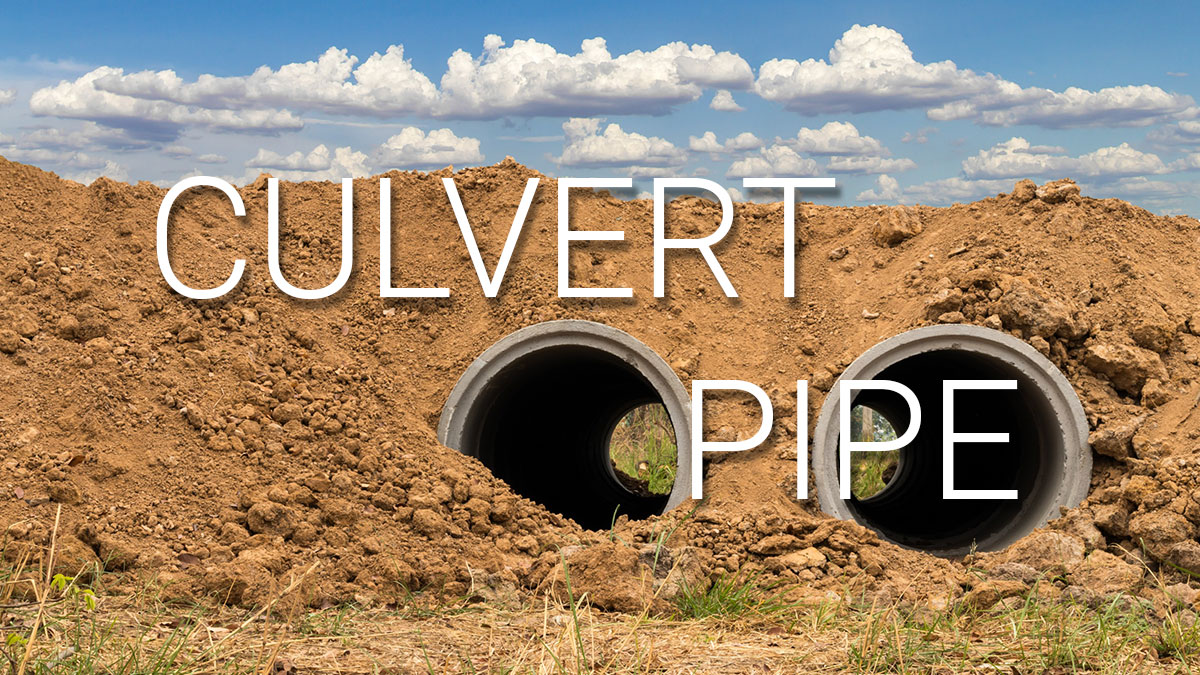
Let’s talk about culverts. No, it’s not the name of a secret spy organization or that restaurant down the street with the really good pancakes. Culverts are those unassuming structures that let water flow under roads, trails, or railways. They might seem mundane, but these pipes are the unsung heroes of construction, ensuring that water goes where it’s supposed to without washing away your freshly laid asphalt or gravel. So, if you’re ready to dive into the nitty-gritty of culvert pipes, grab your hard hat and let’s get started.
What Exactly is a Culvert?
At its core, a culvert is a tunnel-like structure that allows water to pass beneath a road, railroad, trail, or similar obstruction. It’s like a bridge, but for water. Culverts can be made from various materials and come in different shapes and sizes, depending on the project requirements.
Types of Culvert Pipes: A Cornucopia of Choices
When it comes to choosing the right pipe for your culvert, you’ve got options. And just like choosing the right tool for the job, picking the right culvert pipe is crucial.
- Concrete Pipes: The heavyweights of the culvert world. These bad boys are incredibly durable and can withstand a lot of pressure. Perfect for large-scale projects where longevity is key. Just make sure you’ve got the equipment to handle them, as they’re not exactly lightweight.
- Steel Pipes: Strong, durable, and versatile. Steel culvert pipes are great for high-traffic areas and can be coated to resist corrosion. They come in various forms like corrugated steel pipes (CSP) and spiral rib pipes, offering flexibility for different project needs.
- Plastic Pipes: Lightweight and easy to install, plastic culvert pipes (often made from high-density polyethylene, or HDPE) are a popular choice for smaller projects. They’re resistant to corrosion and chemical damage, making them a good fit for various environments.
- Aluminum Pipes: If you’re looking for something that’s both strong and lightweight, aluminum might be your answer. These pipes are resistant to rust and corrosion, making them ideal for wet environments.
Size Matters: How to Determine the Right Size for Your Culvert
Choosing the right size for your culvert is like picking the right size boots – too small and you’ve got a problem, too big and you’re just wasting resources. Here’s a simple guide to get it right:
- Flow Rate: Calculate the flow rate of the water that needs to pass through the culvert. This involves looking at the watershed area and the amount of rainfall. Trust me, you don’t want to guess on this one.
- Culvert Slope: The slope of your culvert affects the water flow speed. A steeper slope increases flow speed, which might mean you need a larger diameter to handle the increased water volume.
- Headwater Depth: This is the depth of water upstream of the culvert. Ensure your culvert can handle the headwater depth without causing flooding or upstream damage.
- Environmental Considerations: Consider the environment where the culvert will be installed. For example, areas prone to heavy sediment might require a larger diameter to prevent clogging.
The Homeowner’s Shorthand: Driveway Culvert Pipes
For homeowners looking to install a culvert pipe under their driveway, the process can seem daunting. But fear not, here’s a quick rundown to help you choose the right pipe:
- Material: For most residential driveways, plastic pipes (HDPE) are a popular choice due to their durability and ease of installation. They’re resistant to corrosion and can handle the load of typical household traffic.
- Size: A common size for residential driveway culverts is 12 inches in diameter. However, the specific size you need can depend on local regulations and the amount of water flow. It’s always best to check with your local municipality or a professional for guidance.
- Length: The length of the culvert should extend beyond the driveway by at least a few feet on each side to prevent erosion and ensure proper water flow.
Buying the Right Culvert Pipe: Tips and Tricks
So, you’ve measured twice and you’re ready to cut once – but where do you buy your culvert pipe? Here are some tips to make the purchasing process smoother than freshly poured concrete:
- Local Suppliers: Start with local suppliers. Not only can you often get a better deal, but you also save on shipping costs. Plus, local suppliers are familiar with regional regulations and environmental conditions.
- Quality Matters: Don’t skimp on quality. A cheap pipe might save you money now, but it could cost you much more in repairs and replacements down the road.
- Check the Specs: Make sure the pipe meets the necessary specifications for your project. This includes material, size, and load-bearing capacity.
- Installation Support: Some suppliers offer installation support or recommendations. It’s worth asking, especially if you’re tackling a larger project.
- Reviews and Recommendations: Look for reviews or ask for recommendations from fellow construction professionals. Word of mouth is often the best way to find reliable products.
Choosing the right culvert pipe might not be the most glamorous part of your job, but it’s crucial for the success of your project. Whether you’re dealing with a trickling stream or a roaring river, the right culvert pipe ensures that water flows smoothly, roads stay intact, and your project stands the test of time. So, next time you’re standing in the aisle of your local supplier, you’ll know exactly what to look for (or, at least what questions to ask) – and you can walk out with confidence, knowing your culvert is in good hands.
Remember, in the world of construction, it’s often the small details that make the biggest difference.
More recommended articles
Building Steep Driveways: Challenges and Solutions in Modern Construction
Trench Box Safety: A Must-Know Guide for Every Construction Worker
Stop losing profit.
Build bids in minutes and track every dime with ProfitDig.
Start Risk-Free30-Day Money Back Guarantee